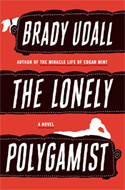
[W. W. Norton & Company; 2010]
by Nika Knight
The Lonely Polygamist, Brady Udall’s second novel, is a darkly funny family drama at turns devastating, thoughtful, hilarious and sublime. Taking place in the 1970s’ American Southwest, the story revolves around Golden Richards, a fundamentalist Mormon man with four wives and 28 children. While a crucial aspect of the plot is the Richards family’s polygamy, the novel never exploits the fundamentalist practices of its main characters as a jumping-off point for voyeuristic scandal a lá HBO’s Big Love, or its sleazy reality-show sibling, TLC’s Sister Wives — rather, the novel begins as Golden Richards struggles with that most mundane of modern challenges: making ends meet.
The pressures of providing for the 30+ members of this family with his struggling construction business have led him to take a verboten job: building a brothel. But Richards is a man of strong moral convictions, and prostitutes are hardly his problem (he’s scarcely able to make eye contact with them); rather, overburdened with the responsibilities inherent to his role as the family patriarch, he begins keeping larger secrets. Golden manages to arrange more and more time away from home at his construction job to escape his responsibilities, leading to straying eyes and, ultimately, near-abandonment of his wives and children.
At home, the sister-wives feud—two or more are on the verge of real nervous breakdowns—and Golden’s children run wild through the family’s falling-down houses. Udall’s lens is Dickensian in scope; we are treated to sublime descriptions of things ranging from hydrogen bombs (the desert the family calls home is also a testing site for the atom bomb), the devastating death of a child and the stillbirth of a baby, the story of Golden’s tragi-comic childhood and eventual conversion to The Principle, in addition to the individual travails and elation of his wives and children that make up the fabric of the novel.
As the story moves forward and Golden strays ever farther from his family, tensions build and Golden becomes ever-more ensnared in binds of his own making—until an event of cruel devastation forces all of his family to see each other anew. And throughout the narrative, rising tensions are lifted by Udall’s glorious sense of humor, his transparent affection for his characters, and a pitch-perfect ear for the vernacular of the American Southwest. And through it all, more than anything, The Lonely Polygamist is about the love behind those ties that bind:
“[T]his … was the basic truth they all chose to live by: that love was no finite commodity. That it was not subject to the cruel reckoning of addition and subtraction, that to give to one did not necessarily mean to take from another; that the heart, in its infinite capacity—even the confused and cheating heart of the man in front of her, even the paltry thing now clenched and faltering inside her own chest—could open itself to all who would enter, like a house with windows and doors thrown wide, like the heart of God itself, vast and accommodating and holy, a mansion of rooms without number, full of multitudes without end.”
Like that other novel that opens with a map of its characters’ names and connections—I’m looking at you, 100 Years of Solitude—The Lonely Polygamist is a story about love in all its multitude of forms.
This post may contain affiliate links.








